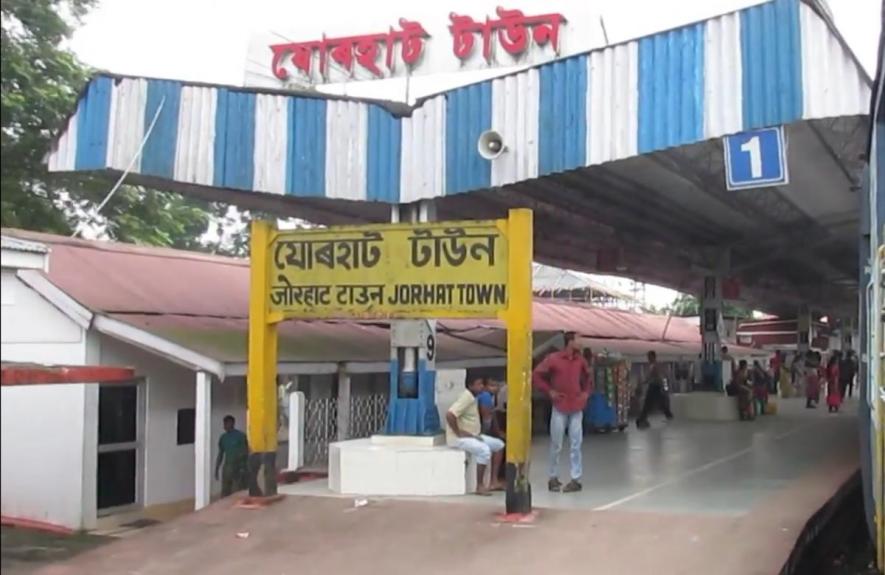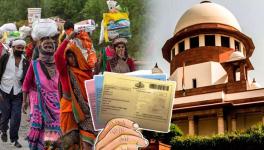Delhi to Jorhat: A Long, Winding Road Trip Through the Pandemic

Image for representational use only.
It was late that hot summer night when the bus finally started off from Delhi. Sree’s* heart was a whirlpool of conflicting emotions, relief and anticipation mostly, but also fear about the next three days of a perilous road trip that would take her to her home in Jorhat, Assam, some 2,000 kilometres across Northern India.
It was March end. There was a menacing pandemic, not yet raging but looming large. She had been locked down in Delhi, all alone in her rented room, books and other possessions already dispatched back home. For nearly two months, she had looked forward to this return back to her beloved parents. The time was finally here.
A civil services aspirant, Sree was preparing to go home after finishing her coaching in March. Worried by warnings for safety and precautions, she had decided to return to Assam earlier than planned. After dispatching her books and most other possessions, she was booked to fly home on March 25. But all her plans came crashing down. At 8 p.m on March 24, the Prime Minister announced a sudden countrywide lockdown starting midnight. With barely four hours’ notice, Sree could do nothing. She was stranded in her bare room for what turned out to be a 54-day ordeal.
The Prelude: 54 Days of Lockdown
This was a period of overwhelming and ever circling uncertainties. Would Sree be able to get essential food and other necessities? What would happen if she fell sick? How could she study, with all books and notes already dispatched home? She talked to her parents and friends every day on phone – seeking reassurance, and providing it, too. For, everyone was in the same state of mind.
In the initial days of the lockdown, news about racial discrimination faced by people from the North East created more fear in her mind. “For the first time in so many years, I felt like an outsider. Despite several such cases being reported across the country, and even in Delhi, there was no statement of assurance by the government, be it the Centre or by Delhi chief minister Arvind Kejriwal. I felt unsafe to go out to even buy essentials,” she recalls.
Sree is one among lakhs of migrants from North East India in the national capital, driven to migrate to the city due to lack of educational and job opportunities in their home states.
As per the All India Survey on Higher Education (AISHE) 2018-19 conducted by the Ministry of Human Resources Development, the gross enrollment rate in higher education among the 18-23 years age group in Assam is 18.7%, much lower than the national average of 26.3%. This is a reflection of how Assam is still lagging in the educational sector, especially in higher education, forcing young people to go out for studies.
Sree came to Delhi in 2011 for her graduation. The 2011 Census data shows that around three lakh people had migrated from Assam in the previous nine years, out of which 12,000 were students, a number that is likely to have increased in the following decade.
Sree hoped the lockdown would end after 21 days, but it was extended – and so did the uncertainties and fear. To top it, tension was growing about of her ageing parents, living on their own in Jorhat and in need of support during the lockdown.
“The regional media’s sensational reporting created fear in my parents’ mind. They were getting increasingly worried about my well-being, especially with news about racial discrimination and the rising number of COVID-19 cases. I started fearing every call from home as I felt helpless. I was stuck in Delhi and couldn’t help them in any way,” she says.
Finally, when buses and trains were allowed to ply, Sree saw a ray of hope. But, she soon realised that travel was not so easy. The train tickets ran out as soon as they were announced. “As far as private buses or vehicles are concerned, I was not sure about the safety of travelling in them. For a single woman to undertake a journey of hundreds of kilometres was really scary, particularly during these troubled times,” she says.
But, without any other way out, Sree finally decided to take the plunge and undertake the arduous journey from Delhi to Guwahati, on a bus arranged by an NGO in Delhi.
The Journey: A Chilling Discovery of India
First, Sree was required to get herself screened for the infection. This was a harrowing experience, as hundreds of people from various states were huddled together at a government-run screening centre No social distancing guidelines were being followed and sanitation facilities were unhygienic and unclean. The administration’s apathetic attitude towards its citizens heightened her fear. The whole day passed by before the passengers were finally dropped off at their boarding point.
Sree, on her part, meticulously followed the guidelines. On the first day, in addition to wearing a mask and gloves and frequently using the hand sanitiser, she did not eat anything outside. The journey organisers had advised passengers to carry their own food, but carrying food for a journey that was to last nearly 60 hours was difficult. The food she had packed was over by the second day. Terrified, but hungry, she had to venture out to a roadside dhaba (eatery) somewhere in the hinterland of Eastern Uttar Pradesh.
All Sree’s fears about transmission of the infection during the journey seemed to be coming true. Every place the bus stopped for using public utilities, she saw dozens of people using the same facility without any disinfection being carried out. “The washrooms were dirty everywhere, be it in UP, Bihar or West Bengal. But using these utilities was the only option we had. I realised that no matter how much I try to maintain my safety, it was all left to my luck,” she says.
A striking image that remains etched in her mind is that of the highways in UP and Bihar crowded with people who were wearily trudging back home, maybe walking hundreds of kilometres. “I saw an unending stream of people on foot, lugging their few possessions. It was a picture of people having lost hope in the government they elected,” she adds.
In Assam: So Close, Yet So Far
By the second day, the landscape flashing past had started changing – it became greener, villages looked different, as did the people. Sree soon realised that though delayed, she was closer home. After travelling for almost 45 hours, on the evening of May 19, they reached Srirampur, marking the border between West Bengal and Assam. The bus was sanitised at the checkpost but they could leave only after an unbearable (and unexplained) wait of nearly six hours. Exhausted yet elated, Sree and her co-passengers finally reached Guwahati on the morning of May 20.
The last leg of the journey – to Jorhat – awaited, and Sree was getting impatient. But she had not anticipated the bungling administrative machinery and lack of coordination.
“There was complete confusion at the screening centre in Guwahati. We stood in the almost kilometre-long queue for over an hour and then were informed that our testing will not be done at this centre, but in Jorhat!” she recalls.
Another bus was arranged for the final leg to Jorhat. Sree and the others settled down, but after about three hours, the bus driver was informed that a security car was being sent to accompany them. This meant another two hours of waiting. “With the security escort, things became worse. They did not allow us stop even to use washrooms. After several requests, they finally let us stop near Kaziranga so that we could go and relieve ourselves behind the bushes,” she says.
The journey from Guwahati to Jorhat, which usually takes six-seven hours, took more than 10 hours. The bus finally reached the screening centre at around 11 o’clock at night. “I was so relieved to have reached my hometown. Little did I know that the night was far from over,” she adds.
A hotel had been fixed up for the mandatory quarantine, but they refused to let the weary passengers in, saying nobody had told them. So, at 3 o’clock at night, they were taken to an institutional quarantine centre, five women were allotted a room with four beds. “The washroom was stinking, the room was a mess. We were given some watery dal and rice, our first meal since we left Guwahati at 10 o’clock that morning,” Sree recounts.
Finally, the reunion with her parents and relatives was joyous though restrained. Sree remained at the quarantine centre till her COVID-19 results came. She tested negative and finally reached home on May 25.
Changed Forever
“The journey seared my brain. The experience was unforgettable, the emotions tumultuous. I saw and learnt so much – about myself, and about how this country runs, how people who are nameless and faceless cope with crisis. I have changed forever,” reflects Sree.
Aware of her privileges, She rues: “A thought that has kept growing in me during and since the journey is: I was privileged to be travelling in a bus, with safety precautions, with money in my pocket, heading back to my loved ones. But the thousands (of migrants) I saw walking on highways, with all their belongings on their heads, forlorn and full of despair …what of them? What will happen to them?”
*Name has been changed on request.
Get the latest reports & analysis with people's perspective on Protests, movements & deep analytical videos, discussions of the current affairs in your Telegram app. Subscribe to NewsClick's Telegram channel & get Real-Time updates on stories, as they get published on our website.
























